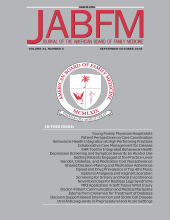To the Editor: We do a disservice to our medical students when we emphasize that their debt will affect their choice of specialty.1,2 From the day they matriculate students hear that their medical school debt is likely to affect their career choice. Throughout medical school, financial aid and career counselors bring this up again and again. Students hear the false dichotomy requiring them to choose between a generous income or primary care. Yes, the data show an association of debt with specialty choice. But there are tens of thousands of family doctors with hundreds of thousands of dollars of debt. Debt is not a factor in specialty choice for thousands of students each year. Bazemore et al2 report >1800 respondents chose family medicine despite >$150,000 of debt, and nearly 800 made the choice of family medicine carrying >$250,000 of debt. (That is $200,000,000 of debt that did not affect career choice. And over the first 10 years of their careers these 800 family doctors will earn >$1.5 billion).
While debt may affect some students' specialty choice, debt also may be used as an excuse by students who were planning to enter high-income specialties regardless. It is unlikely that debt is the deciding factor between choosing a career in family medicine versus ophthalmology or radiology. The more important issue for specialty choice may be medical school admissions. Who enters medical school may be a more potent predictor of specialty choice than how much debt they accumulate.
One wonders about these 800 individuals who entered family medicine despite their debt. What might we learn from them that can inform other medical students making career choices? And how do we get more of them into medical school?
Fixing the income disparities among primary care and specialty physicians is important. Getting the right people into medical school may be even more important. And helping students understand they have the choice to enter family medicine and still enjoy a comfortable income is crucial.
Notes
The above letter was referred to the author of the article in question, who offers the following reply.







